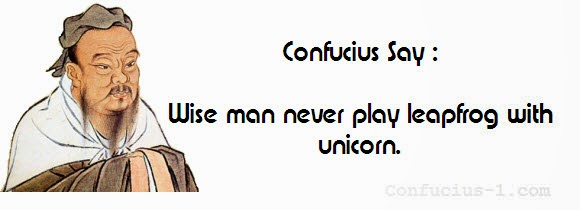Confucius, also known as Kong Qui, was born August 27, 551
B.C. in Tuo, China. Very little is known of Confucius’s early childhood, aside
from the fact that he had one. The only historical text we have detailing that
time is Records of the Historian. Despite the books title, many modern
historians consider the book to be more fiction than fact based. According
to Records of the Historian, Confucius was born into a royal family
of the Chou Dynasty. Some other historical accounts consider him to have been
born into a poverty-stricken home. No matter the debate, all historians can
agree that he lived during a time of ideological turmoil. During the
sixth century B.C., there was an uprising against the surviving Chou dynasty, a
lineage that went back nearly 500 years. Traditional Chinese principles began
to deteriorate, resulting in a period of moral decline. Confucius recognized
this to be a time where moral reinforcement was a necessity, and took it upon
himself to bring about that change.
His social philosophy was focused around
the principle of "ren" or "loving others" while exercising
self-discipline in the matter. Confucius believed that ren could be best
exemplified in what would become known as the Golden Rule: "What you do
not wish for yourself, do not do to others." Confucius’ political beliefs reflected
his moral philosophy, in that compassion must lead with self-discipline
reigning over powerful emotions. He believed that a leader needed to exercise
self-discipline in order to remain humble and treat his followers with
compassion. In doing so, any leader who was compassionate towards his followers
would lead by example and be a positive influence on the nation he ruled.
According to Confucius, leaders could stabilize the philosophical undertones of
their subject by teaching them good virtue, which would in turn reflect in how
they went about their daily lives, and the unifying force of ritual propriety. His
philosophy of education focused on the "Six Arts": archery,
calligraphy, computation, music, chariot-driving and ritual.
To Confucius, the
true goal of teaching was to teach people how to live and xo-exist with
integrity, through which all walks of life would be affected. Through his
teachings, he strove to resurrect the traditional values of benevolence,
propriety and ritual in Chinese society.
The Confucian worldview is generally based on two questions: a
person's understanding of heaven, and people's relationships with the heavenly
realm. The human soul is the highest valued among the earthly realm’s properties
-- even as great as heaven and earth are with one's own efforts and creation.
The emphasis of Confucianism is to explore the heavenly part of
human nature and attune our souls with the existence much higher than our own.
Numerous Confucian scholars in history have devoted their lives to this ideal,
offering their own solutions to finding the gateway to the heavenly realm.
Aside from cosmic and ethereal awareness, social philosophy is the
most treasured part of Confucian theory. To design and build an ideal human
society is the most primitive concern of Confucianism, and the many routes
taken in an attempt to attain this have all been attributed back to
Confucianism. Important thinkers like Confucius, Mencius, and Xunzi all have
systematic views about society, politics, economy, and ethics.
The structure of Confucian social philosophy is very well
organized. Political system, administrative principles like policies of
benevolence, light taxes, and ruling by rites are very representative views in
traditional Confucian thoughts. The study of Confucius classics during the Han
dynasty (206BC-220AD) gave birth
to the social system designed in accordance with the Confucius theories.


Maybe it's because westerners couldn't properly pronounce his name, so they gave him one that sounds funny and invites jokiness.
ReplyDeleteBest Confucius nook on campus: the little seating area in front of the library with this quote etched in the pavement: "They who know the truth are not equal to those who love it, and they who love it are not equal to those who delight in it." Confucius